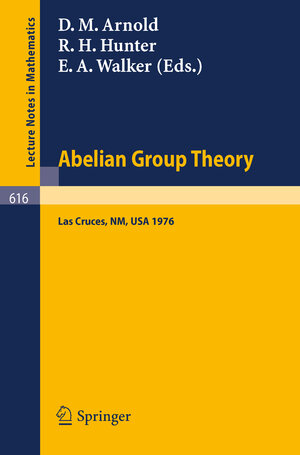
×
![Buchcover ISBN 9783540084471]()
Abelian Group Theory
Proceedings of the 2nd New Mexico State University Conference, held at LasCruces, New Mexico, December 9 - 12, 1976
herausgegeben von D. Arnold, R. Hunter und E. WalkerInhaltsverzeichnis
- The structure of mixed abelian groups.
- Decomposition bases and Ulm’s theorem.
- The structure of p-trees: Algebraic systems related to abelian groups.
- A Guide to valuated groups.
- Warfield modules.
- Finite valuated groups.
- Criteria for freeness in groups and valuated vector spaces.
- Subfree valued vector spaces.
- On classifying torsion free modules over discrete valuation rings.
- A sheaf - Theoretic interpretation of the kuroš theorem.
- Genera and direct sum decompositions of torsion free modules.
- Quasi-pure-injectivity and quasi-pure projectivity.
- Sur les groupes quasi-p-nets injectifs et projectifs.
- Whitehead’s problem.
- Methods of logic in abelian group theory.
- Abelian structures I.
- The number of ? — Free abelian groups and the size of Ext.
- The Jacobson radical of some endomorphism rings.
- Ulm valuations and co-valuations on torsion-complete p-groups.
- A result on problem 87 of L. Fuchs.
- Local-quasi-endomorphism rings of rank one mixed abelian groups.
- Homological dimension and abelian groups.
- A galois correspondence in abelian groups.
- A different completion functor.
- Analogues of the Stacked Bases Theorem.
- Commutative rings whose finitely generated modules are direct sums of cyclics.



